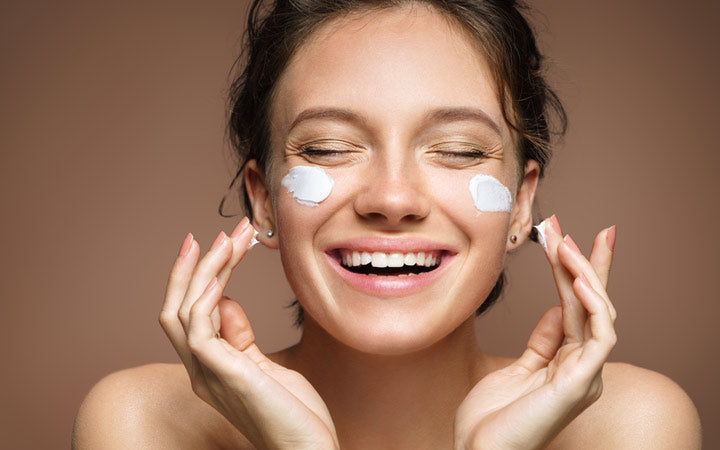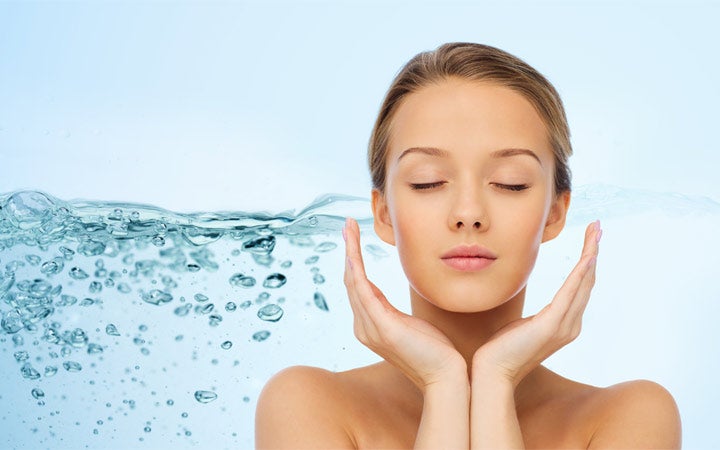[ad_1]
Does your skin appear dull and feel dry or tight? It might be a sign of dehydration.
While slathering on cream, serums, and other skincare products are important to maintain your skin’s health and keep it glowing, hydrating your skin from the inside out is key to keep it nourished.
In this article, we tell you how to hydrate your skin and its benefits. Read on!
What Expert Says
“Products containing hydrating agents like glycerin, hyaluronic acid, urea and ammonium lactate can preserve skin hydration.”
Dr. Harish Koutam, Chief Dermatologist, SkinKraft
Highlights:
What Is Hydrated Skin?
It’s natural to think of water when you hear the word ‘hydration’. Rightly so, hydrating your skin means increasing its water content. If your skin is dehydrated, it can appear flaky, dull and dry.
Hydrated skin is smooth, radiant and has an even tone. To achieve this, you need to quench your skin’s thirst from time to time.
However, people often tend to confuse dehydrated skin with dry skin. Although used synonymously, there is an underlying difference between the two.
What Causes Dehydrated Skin?
1. Extreme Temperatures
Extreme hot or cold temperatures can damage the natural barrier of your skin. While it might be difficult to avoid extreme temperatures, make sure to limit your exposure to a minimum.
2. Over Exfoliation
Exfoliating overly can damage your skin’s natural moisture barrier. It can be more damaging if you use harsh, abrasive products while exfoliating your skin.
3. Aggressive Cleansers
Skincare products with caustic, harmful ingredients can damage the ability of your skin to retain moisture.
4. Air Conditioning
Reduced humidity due to air conditioning units can take a toll on your skin’s health. Lack of humidity damages the moisture barrier of the skin, this making it dehydrated.
“Alkaline substances like soaps, acids with higher pH should be avoided to preserve skin fragility,” says Dr. Harish Koutam, Chief Dermatologist at SkinKraft.
Dehydrated Skin Vs Dry Skin
Dehydrated skin lacks water, whereas dry skin lacks a fair amount of sebum. Dry skin can also be the result of certain medications or diseases.
Factors like climate, lifestyle, age and the products you use on your skin can contribute to a change in your skin type.
1. Symptoms Of Dry Skin
- Itchiness
- Redness
- Flaky skin
- Skin irritation
2. Symptoms Of Dehydrated Skin
- Dull/dark looking skin
- Prominent dark circles and shadows around eyes
- Itchiness
- Appearance of fine lines/wrinkles
- Dry mouth
- Puffy eyes
- Increased sensitivity
Hydration vs Moisturization
While hydrating your skin requires you to add water to it, moisturizing your skin implies adding ingredients that lock the water inside. Moisturization and hydration go hand in hand.
If you only add water to your skin, it may temporarily feel plump. However, the water will escape from your skin if there is nothing to retain it.
Moisturization involves adding ingredients that lock in the moisture and repair your skin’s barrier. This prevents water loss and improves your skin’s texture and health.
How To Hydrate Your Skin: 10 Steps
1. Drink An Adequate Amount Of Water
The first step to hydrating your skin is hydrating your body. It is recommended for you to drink at least 8 glasses of water every day. Your body may require more, depending on your daily activities and weight.
2. Use Hydrating Skincare Products
Water-based creams are recommended if you have dehydrated skin. Products that penetrate through your skin and deliver water are vital if you have dehydrated skin.
According to Dr. Harish, “Products containing hydrating agents like glycerin, hyaluronic acid, urea and ammonium lactate can preserve skin hydration.”
Look for the following hydrating ingredients:
A. Hyaluronic Acid
Plays an important role in hydrating your skin and maintaining its elasticity (1). Hyaluronic acid’s water-binding properties help replenish your skin and also prevents early signs of ageing (2).
B. Glycerin
A popular ingredient of the beauty industry, glycerin has hydrating properties that can relieve your skin from feeling dry and itchy. This is because glycerin is a humectant. So it works by attracting moisture from the environment onto the surface of your skin (3).
C. Urea
Another widely used ingredient in the dermatological world, urea loosens and breaks down hardened protein, relieving your skin of roughness and itchiness (4).
D. Ceramides
These are skin replenishing ingredients, like the cement that supports the bricks of a building. They make up and repair your skin’s barrier, which prevents water loss and retains moisture (5).
E. Panthenol
Panthenol is an ingredient that penetrates through the skin and imparts moisture to the cells. It also prevents trans-epidermal water loss. This means that it improves skin barrier functions by stimulating cells that boost the same.
3. Avoid Very Hot And Long Showers
As contradictory as it may sound, bathing for long hours can eradicate your skin’s barrier. This may result in loss of moisture content and necessary oils which can dehydrate your skin. Using lukewarm water while bathing is ideal.
4. Pamper Yourself With Face Masks/Sheets
Face masks are packed with hydrating ingredients. Incorporating a hydrating face mask into your daily skincare regimen will keep your skin plump and moist. It can also reduce the appearance of fine lines and dark circles.
5. Use A Humidifier
A humidifier can be used when the moisture content in the air around you is low. This can be especially helpful during dry winter months.
6. A Sunscreen Is A Must
Apply a broad-spectrum sunscreen to prevent UVA and UVB skin damage every time you step out in the day. Sun exposure can dehydrate your skin, causing it to lose moisture and break down its collagen and elastin, which are responsible for its strength and elasticity. This can cause premature signs of aging.
7. Eat Foods Rich In Water
Fruits and vegetables are not only hydrating but are beneficial for your skin in many other ways. Citrus-based fruits like oranges and lemons are packed with juice and are rich in Vitamin C, which is vital to maintain your skin’s texture. Foods rich in Vitamin A and B3 are also essential to improve your overall skin health.
8. Reduce Intake Of Caffeine
Both caffeine and alcohol can reduce the water content of your skin, this caus8ng tightness and dehydration. Limit your caffeine and alcohol intake to two cups of coffee and one glass of wine to minimize their impact on your skin.
9. Exfoliate Regularly
Exfoliating your skin is important to get your skin rid of dry patches, dead cells, etc. accumulated due to the lack of moisture. Make sure to exfoliate once in 4-5 days. However, remember not to over-exfoliate as too much exfoliation may disrupt the natural skin barrier, leading to moisture loss.
10. Moisturize
During summers, your body tends to lose a lot of moisture, which is why hydrating yourself from the inside out is important. Besides, eating water-rich foods and drinking adequate water, make sure to cleanse, tone, and moisturize religiously at night before sleeping. Honey and milk are great natural moisturizers, hence you can add them in your skincare routine.
Which Is The Best Moisturizer For You?

Choose your moisturizer based on your skin type. Cream-based moisturizers work well for dry skin. If you have oily skin, a light lotion-based moisturizer will prevent your skin from feeling heavy.
Choose a barrier-repair moisturizer as they work their way into the deeper layers of your skin and repair it from within, preventing it from getting dehydrated.
When Should You Visit A Dermatologist?
Dehydrated skin usually isn’t a serious skin condition. Hydrating serums, creams and lotions can help you improve your skin’s texture. However, if your skin’s overall health doesn’t improve even after your hydration attempt and if you experience any of these symptoms, visit a dermatologist:
- White flakes
- Red patches
- Itchy, irritated skin
- Inflammation
- If dry patches continue to spread on your body/face
Wrapping Up
The two most fundamental steps of nourishing your skin are hydration and moisturization. To keep your skin healthy, young, and wrinkle-free, hydrating it from the inside out is a must. Besides drinking enough water, follow a proper skincare routine, eat water-rich foods, and practice healthy lifestyle habits to enjoy hydrated, healthy skin all year round.
Begin By Knowing Your Skin
[ad_2]
Source link
